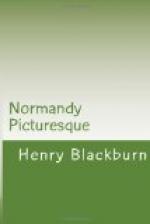But the clouds of smoke that defile the land, the shrieking of steam, and the perpetual, terrible grinding of iron against iron (sounds which our little children grow up not to heed) are part of a system which enables Mr. Ruskin, one day to address a crowd in the theatre of the British Institution, and on the next—or the next but one—to utter this lament on the banks of Lake Leman. His remarks, with which so many will sympathise, lose point and consequence from the fact of his own rapid translation from one place to another, and from the advantages we gain by his travelling on the wings of steam. And there is a certain consolation in the knowledge that in the days when the waters of Geneva were of ‘purest blue,’ the accommodation for travellers at the old hostelries was less favourable to peace of mind.
[Illustration]
CHAPTER X.
THE VALLEY OF THE SEINE.
In the fruitful hills that border the river Seine, and form part of the great watershed of Lower Normandy, Nature has poured forth her blessings; and her daughters, who are here lightly sketched, dispense her bounties.
It is a pleasant thing to pass homeward through this ‘food-producing’ land—to go leisurely from town to town, and see something more of country life in Normandy—to see the laden orchards, the cattle upon the hills, and the sloping fields of corn. It is yet early in the autumn, but the variety of colour spread over the landscape is delightful to the eye; the rich brown of the buckwheat, the bright yellow mustard; the green pastures by rivers, and the poppies in the golden corn; the fields, divided by high hedges, and interspersed with mellowed trees; the orchards raining fruit that glitters in the sunshine as it falls; the purple heath, the luxuriant ferns. There is ’une recolte magnifique’ this year, and the people have but one thought—’the gathering in;’ the country presents to us a picture—not like Watteau’s ‘fetes galantes,’ but rather that of an English harvest-home.




